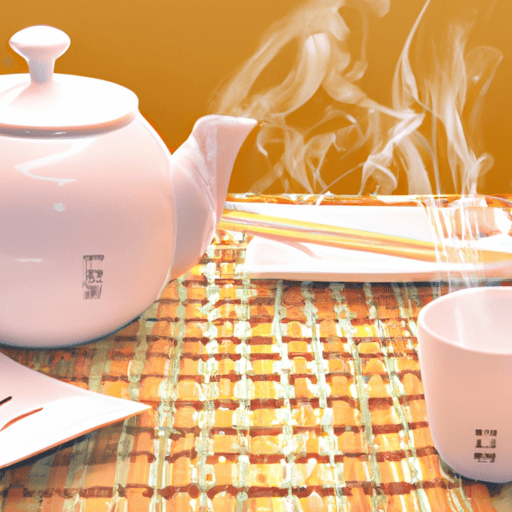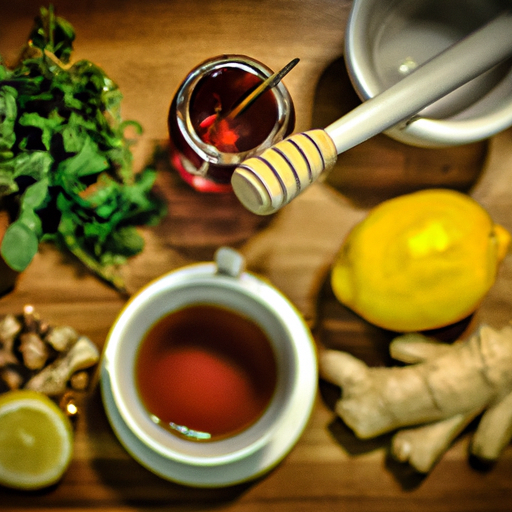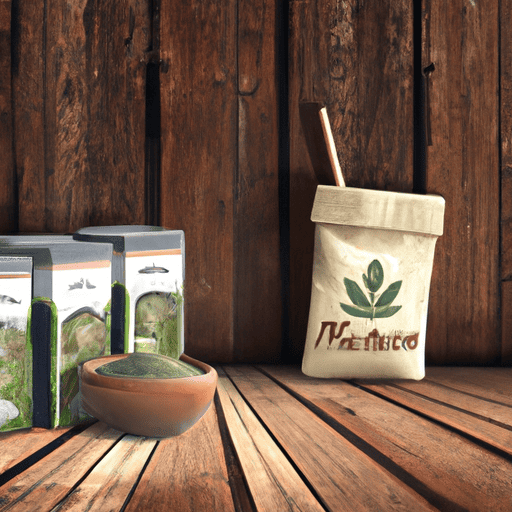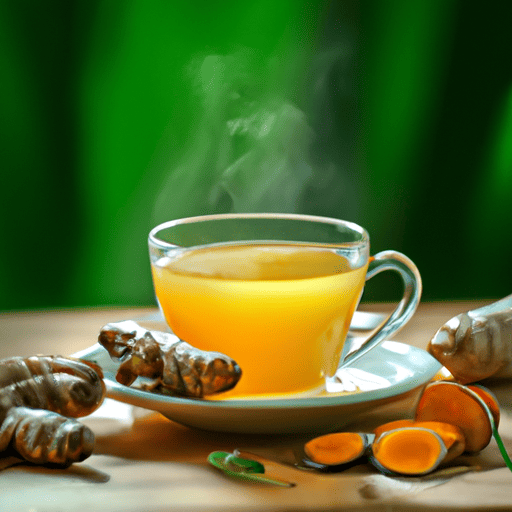Ashwagandha
We Use Ashwagandha to Boost Tea’s Benefits

Did you know that over 80% of adults experience stress on a regular basis?
If you’re looking for a natural remedy to help you relax and find balance, we have an exciting suggestion: ashwagandha in tea. This ancient herb has been used for centuries in Ayurvedic medicine and is known for its potential health benefits.
In this article, we’ll explore the origins, benefits, and ways to incorporate ashwagandha into your daily tea routine.
So, let’s dive in and discover the soothing power of ashwagandha in tea.

Key Takeaways
- Ashwagandha can be used in tea to create a refreshing and revitalizing blend.
- It has adaptogenic properties that help the body respond to stress and reduce cortisol levels.
- Ashwagandha tea can promote a sense of calm and relaxation, alleviating anxiety symptoms.
- Potential side effects and interactions with medication should be considered before incorporating ashwagandha into tea.
What Is Ashwagandha
Ashwagandha, also known as Withania somnifera, is a medicinal herb that has been used for centuries in traditional Ayurvedic medicine. This powerful herb offers numerous benefits when incorporated into your skincare routine or taken as a supplement.
Ashwagandha is known for its adaptogenic properties, meaning it helps the body respond to stress, promoting a sense of calm and balance. It also possesses antioxidant properties, which can protect the skin from free radicals and premature aging.
Additionally, ashwagandha has been shown to enhance collagen production, reducing the appearance of wrinkles and promoting a youthful complexion. Its anti-inflammatory properties can soothe irritated skin, making it an excellent choice for those with sensitive or acne-prone skin.
The Origins of Ashwagandha
One of the earliest recorded uses of ashwagandha can be traced back to ancient Ayurvedic texts. Ashwagandha, also known as Withania somnifera, is a powerful herb that has been used for centuries in traditional medicine. Its historical uses are diverse and encompass a wide range of ailments, including stress, anxiety, and fatigue. The traditional preparation methods of ashwagandha vary depending on the desired effect. Typically, the roots of the plant are ground into a fine powder and mixed with a carrier substance, such as ghee or honey, to enhance absorption. This preparation can then be consumed as a tea, tonic, or added to various culinary dishes. The versatility of ashwagandha and its rich historical background make it a valuable herb in holistic wellness practices.

| Ashwagandha | Traditional | Preparation | Methods |
Ashwagandha’s Potential Health Benefits
Our research has shown that ashwagandha’s potential health benefits are extensive.
Ashwagandha, with its rich medicinal properties, has been traditionally used in Ayurvedic medicine to address various ailments.
One of its notable benefits is its impact on stress and anxiety. Studies have demonstrated that ashwagandha possesses adaptogenic properties, which help the body adapt to and manage stress. It has been found to reduce cortisol levels, a hormone associated with stress, and improve overall well-being.
Additionally, ashwagandha has been shown to enhance the body’s resilience to stress and promote a sense of calm and relaxation. Its ability to alleviate anxiety symptoms makes it a promising natural alternative for individuals seeking relief from stress-related conditions.

Incorporating ashwagandha into one’s daily routine may support mental and emotional well-being, providing a holistic approach to managing stress and anxiety.
Ashwagandha and Tea: A Perfect Pairing
Using ashwagandha in tea can be a perfect pairing for those looking to enjoy its numerous health benefits. When combined, ashwagandha and tea create a harmonious blend that not only delights the senses but also nourishes the body.
Here are four flavor combinations and brewing techniques that make ashwagandha and tea a match made in heaven:
- Ashwagandha and green tea: The earthy undertones of ashwagandha complement the grassy notes of green tea, creating a refreshing and revitalizing brew.
- Ashwagandha and chamomile tea: The calming properties of ashwagandha harmonize with the soothing effects of chamomile, perfect for relaxation and stress relief.
- Ashwagandha and black tea: The robust flavors of black tea pair well with the slightly bitter and nutty taste of ashwagandha, resulting in a bold and invigorating cup.
- Ashwagandha and herbal tea blend: Experiment with different herbal combinations, such as lavender or peppermint, to create a personalized infusion that suits your taste preferences.
Now that we’ve explored the perfect pairing of ashwagandha and tea, let’s delve into how to incorporate ashwagandha into your tea for maximum enjoyment and benefits.

How to Incorporate Ashwagandha Into Your Tea
To incorporate ashwagandha into our tea, we can follow a few simple steps.
One way is to make ashwagandha tea by steeping the herb in hot water for 10-15 minutes. This allows the medicinal properties of ashwagandha to infuse into the tea, creating a calming and rejuvenating beverage.
Another option is to mix ashwagandha powder with loose leaf tea or tea bags, enhancing the flavor and benefits of the tea.
For those who prefer a sweeter taste, adding honey or a natural sweetener can help balance the earthy flavor of ashwagandha.

Additionally, ashwagandha can be incorporated into other beverages like smoothies, lattes, or even cocktails for a unique twist.
Now, let’s explore the flavor profile of ashwagandha in tea and how it can enhance our tea-drinking experience.
The Flavor Profile of Ashwagandha in Tea
When incorporating ashwagandha into tea, we can explore the unique flavor profile it brings to our beverage. Ashwagandha, with its earthy and slightly bitter taste, adds depth and complexity to any tea blend. Here are four ways ashwagandha enhances the flavor of herbal teas:
- Rich and earthy: Ashwagandha’s natural flavor lends a grounding and earthy note to the tea, creating a comforting and soothing experience.
- Balancing bitterness: Ashwagandha helps balance the bitterness of certain herbal teas, making them more palatable for those who prefer milder flavors.
- Delicate sweetness: Despite its bitter undertones, ashwagandha also adds a subtle sweetness to the tea, enhancing its overall taste profile.
- Harmonizing blend: Ashwagandha blends harmoniously with other herbs, creating a cohesive and well-rounded flavor that’s both intriguing and satisfying.
Ashwagandha Tea Recipes to Try
As we continue exploring the flavor profile of ashwagandha in tea, let’s delve into some delicious ashwagandha tea recipes to try.

Ashwagandha’s earthy and slightly bitter taste can be complemented with a variety of flavor combinations to create a comforting and nourishing cup of tea.
One popular recipe is the Ashwagandha Chai, which combines the warming spices of cinnamon, cardamom, and ginger with the calming properties of ashwagandha.
Another option is the Ashwagandha Lavender Tea, where the floral notes of lavender enhance the soothing effects of ashwagandha.
To prepare these teas, simply add the desired amount of ashwagandha powder or dried roots to boiling water and let it steep for 5-10 minutes.

Experiment with different brewing techniques and ingredients to find your perfect cup of ashwagandha tea.
Choosing the Right Ashwagandha for Your Tea
We recommend selecting the appropriate type of ashwagandha for our tea. When it comes to choosing the right ashwagandha for your tea, there are a few factors to consider. Here are some key points to keep in mind:
- Type of Ashwagandha: Look for organic and sustainably sourced ashwagandha powder or root. This ensures that you’re getting the highest quality product for your tea.
- Flavor Combinations: Consider the flavor profile you desire for your tea. Ashwagandha has a slightly bitter and earthy taste, so it pairs well with ingredients like cinnamon, ginger, and cardamom for a warm and aromatic blend.
- Brewing Methods: Different brewing methods can affect the potency and flavor of your ashwagandha tea. Experiment with steeping times and temperatures to find the perfect balance.
- Dosage and Safety Considerations: It’s important to follow recommended dosage guidelines for ashwagandha and consult with a healthcare professional if you have any underlying health conditions or are taking medications.
Now that we’ve discussed choosing the right ashwagandha for your tea, let’s delve into ashwagandha dosage and safety considerations.
Ashwagandha Dosage and Safety Considerations
When it comes to using ashwagandha in tea, it’s important to understand the optimal dosage for maximum benefits. The dosage can vary depending on factors such as age, health condition, and desired outcomes.

However, it’s generally recommended to start with a lower dosage and gradually increase it to find the right amount that works for you.
Additionally, it’s crucial to be aware of potential side effects and interactions with medications, especially if you’re currently taking any prescription drugs. Consulting with a healthcare professional is advised to ensure safety and effectiveness.
Optimal Ashwagandha Dosage
To determine the optimal dosage of ashwagandha and consider safety precautions, it’s important to understand the potential benefits and risks associated with its consumption. Ashwagandha is a powerful herb that has been used for centuries in traditional Ayurvedic medicine.
When it comes to finding the right dosage, here are a few key points to consider:

- Start low and gradually increase: Begin with a low dosage and monitor how your body responds. Slowly increase the dosage over time if needed.
- Follow recommended guidelines: The optimal dosage of ashwagandha can vary depending on factors such as age, health condition, and desired effects. It’s best to consult with a healthcare professional or follow the instructions on the product label.
- Be mindful of potential side effects: While ashwagandha is generally considered safe, some individuals may experience side effects such as upset stomach, diarrhea, or drowsiness. It’s important to be aware of these potential side effects and adjust the dosage accordingly.
- Consider individual differences: Each person’s body is unique, and what works for one may not work for another. Pay attention to how you feel and make adjustments as needed.
Understanding the optimal dosage of ashwagandha is crucial for ensuring its effectiveness and safety. However, it’s equally important to be aware of potential side effects that may arise.
Now, let’s delve into the topic of potential side effects and how to mitigate them.
Potential Side Effects
To ensure the safe and effective use of ashwagandha, it’s important to be aware of the potential side effects that can arise from its consumption. While ashwagandha is generally considered safe, it isn’t without its risks. Some individuals may experience gastrointestinal discomfort, such as nausea or diarrhea, when taking ashwagandha.
Additionally, there have been reports of allergic reactions in rare cases. It’s also crucial to consider potential interactions with medication. Ashwagandha may interact with certain drugs, including sedatives, immunosuppressants, and thyroid medications. Therefore, it’s essential to consult with a healthcare professional before incorporating ashwagandha into your routine, especially if you’re taking any medications.

Further research is needed to fully understand the effects of ashwagandha in tea and its safety considerations.
Interactions With Medications
We need to consider the interactions between ashwagandha and medications for dosage and safety considerations. As with any herbal supplement, it’s important to be aware of how ashwagandha may interact with other medications you’re taking. Here are some key points to keep in mind:
- Talk to your healthcare provider: Before incorporating ashwagandha into your routine, it’s crucial to consult with your healthcare provider to ensure it won’t interfere with any medications you’re currently taking.
- Potential drug interactions: Ashwagandha may interact with certain medications, such as sedatives, immunosuppressants, and thyroid medications. It’s important to be aware of these potential interactions and adjust your dosage accordingly.
- Dosage recommendations: Your healthcare provider can provide guidance on the appropriate dosage of ashwagandha while taking into account your specific medications and health conditions.
- Regular monitoring: If you decide to use ashwagandha alongside your medications, it’s essential to regularly monitor your health and report any unusual symptoms or changes to your healthcare provider.
Precautions and Possible Side Effects of Ashwagandha
Some possible side effects of using Ashwagandha in tea include a few instances of gastrointestinal distress and headaches. While Ashwagandha is generally considered safe for most people, it’s important to exercise caution and be aware of potential side effects.
It’s also advisable to consult with a healthcare professional before incorporating Ashwagandha into your daily routine, especially if you’re taking medications. Ashwagandha may interact with certain medications, such as immunosuppressants, sedatives, and thyroid medications.

Research and studies have shown that Ashwagandha may lower blood sugar levels, so individuals with diabetes should monitor their blood sugar closely.
Additionally, pregnant or breastfeeding women should avoid using Ashwagandha due to limited research on its safety during these periods.
Research and Studies on Ashwagandha in Tea
When it comes to researching and studying the efficacy of Ashwagandha in tea, there have been numerous investigations conducted to shed light on its potential health benefits.
These studies have explored its effects on various aspects of human health, such as stress reduction, immune system support, and cognitive function improvement.

The findings suggest that Ashwagandha tea may indeed have positive impacts on overall well-being, making it a promising botanical option to consider for daily consumption.
Efficacy of Ashwagandha Tea
Research and studies have demonstrated the effectiveness of using Ashwagandha in tea. This ancient herb, known for its adaptogenic properties, has been found to provide numerous benefits when consumed in tea form.
Here are four reasons why Ashwagandha tea is a powerful addition to your wellness routine:
- Ashwagandha tea benefits: Ashwagandha is known to support a healthy stress response, promote relaxation, and enhance overall well-being.
- Ashwagandha tea for stress relief: The natural compounds in Ashwagandha have been shown to reduce stress and anxiety levels, helping you find calm and balance in your daily life.
- Improved sleep quality: Ashwagandha tea can help promote better sleep by calming the mind and supporting a restful night’s rest.
- Enhanced cognitive function: Studies have suggested that Ashwagandha tea may improve memory, focus, and mental clarity.
With these compelling findings, it’s clear that Ashwagandha tea offers both immediate and long-term benefits. Now, let’s delve into the potential health benefits associated with this remarkable herb.

Potential Health Benefits
Our research and studies have revealed the potential health benefits of Ashwagandha in tea. Ashwagandha, an ancient medicinal herb, is known for its adaptogenic properties, which help the body cope with stress and promote overall wellness.
When combined with tea, Ashwagandha offers a delightful and soothing experience that nourishes both the body and mind. Ashwagandha tea can be prepared using various recipes, allowing individuals to choose the one that suits their taste preferences and health goals.
It’s important to choose the right ashwagandha for tea, ensuring that it’s sourced from reputable suppliers and is of high quality.
Incorporating Ashwagandha into your daily routine through tea consumption can provide numerous health benefits, such as improved energy levels, reduced anxiety, enhanced cognitive function, and boosted immune system.

Now, let’s explore other ways to enjoy ashwagandha in your daily routine.
Other Ways to Enjoy Ashwagandha in Your Daily Routine
One popular option for incorporating Ashwagandha into our daily routine is through the use of Ashwagandha supplements. However, there are other delightful ways to enjoy the benefits of this wondrous herb. Here are four unique ways to incorporate Ashwagandha into your daily routine:
- Ashwagandha in Smoothies: Blend a teaspoon of Ashwagandha powder into your morning smoothie for an energizing and stress-relieving boost.
- Ashwagandha Infused Skincare Products: Look for skincare products infused with Ashwagandha extract to nourish and rejuvenate your skin naturally.
- Ashwagandha Tea: Brew a delightful cup of Ashwagandha tea by steeping Ashwagandha roots or powder in hot water for a calming and soothing experience.
- Ashwagandha Golden Milk: Indulge in a warm cup of Ashwagandha-infused golden milk before bedtime to promote relaxation and a restful sleep.
Incorporating Ashwagandha into your daily routine in these various ways allows you to experience its holistic benefits and enhance your overall well-being.
Conclusion: Is Ashwagandha in Tea Worth a Try?
In considering whether Ashwagandha in tea is worth a try, it’s important to weigh the potential benefits against any potential side effects.

Ashwagandha tea has been associated with a range of potential benefits, including stress reduction, improved immune function, and enhanced cognitive function.
However, it’s also important to note that some individuals may experience side effects such as digestive issues or drowsiness.
Therefore, it’s recommended to consult with a healthcare professional before incorporating Ashwagandha tea into your daily routine.
Benefits of Ashwagandha Tea
After exploring the potential benefits of Ashwagandha in tea, we believe it’s worth giving it a try. Ashwagandha tea offers a host of advantages, making it a delightful addition to your daily routine. Here are four reasons why you should consider incorporating it into your life:

- Enhanced relaxation: Ashwagandha tea is known for its calming properties, helping to reduce stress and promote a sense of tranquility.
- Boosted immunity: This herbal tea contains compounds that support a healthy immune system, helping to ward off illness and keep you feeling your best.
- Improved cognitive function: Ashwagandha has been shown to enhance memory and focus, making it a great choice for those seeking mental clarity.
- Balancing hormones: Ashwagandha tea can help regulate hormone levels, providing relief from symptoms associated with hormonal imbalances.
With its flavorful blends and various brewing techniques, Ashwagandha tea offers a natural and holistic way to improve overall well-being. Give it a try and savor the benefits it brings to your life.
Potential Side Effects
Continuing our exploration of the potential side effects, let’s now delve into whether incorporating Ashwagandha in tea is worth a try. While Ashwagandha is generally considered safe for most people when taken in appropriate doses, it is important to be aware of potential interactions with medications and take necessary precautions for safety.
To help you make an informed decision, we have provided a table summarizing the known interactions and precautions associated with Ashwagandha:
| Medication Interactions | Precautions | Safety Tips |
|---|---|---|
| Immunosuppressants | Pregnancy and breastfeeding | Start with low doses |
| Sedatives | Thyroid disorders | Monitor for any adverse effects |
| Anti-anxiety medications | Autoimmune conditions | Consult with a healthcare provider |
| Blood pressure medications | Stomach ulcers | Discontinue use before surgery |
It is essential to consult with a healthcare provider before incorporating Ashwagandha in tea, especially if you are taking any medications or have underlying medical conditions. They can provide personalized guidance based on your specific circumstances, ensuring your safety and well-being. With proper precautions and guidance, Ashwagandha in tea may be worth considering as a holistic approach to supporting overall health and well-being.

Frequently Asked Questions
Can Ashwagandha Be Consumed in Forms Other Than Tea?
Yes, we can consume ashwagandha in alternative forms besides tea. However, it’s important to follow dosage recommendations. Ashwagandha has many potential health benefits, and exploring other forms can provide a holistic approach to wellness.
What Are the Potential Health Benefits of Ashwagandha in General?
Potential uses, dosage, and effectiveness of ashwagandha in promoting mental health and reducing stress are important to explore. Its benefits are supported by scientific research, making it a promising botanical for improving overall well-being.
Are There Any Specific Precautions or Safety Considerations When Using Ashwagandha in Tea?
Precautions and dosage should be considered when using ashwagandha in tea. It’s important to be mindful of potential side effects and consult with a healthcare professional to determine the appropriate amount to consume.
Are There Any Known Side Effects of Consuming Ashwagandha in Tea?
Side effects of ashwagandha in tea can occur if the recommended dosage is exceeded. However, when used properly, ashwagandha tea can provide numerous benefits for our overall well-being. Let’s explore this botanical remedy further.

What Are Some Other Ways to Incorporate Ashwagandha Into Your Daily Routine Besides Tea?
Certainly! Besides tea, we can incorporate ashwagandha into our daily routine by adding it to smoothies or taking it in capsule form. These methods provide alternative ways to enjoy the benefits of ashwagandha.
Conclusion
In conclusion, incorporating ashwagandha into your daily tea routine can be a wonderful way to experience its potential health benefits.
Like a harmonious blend of nature’s elements, ashwagandha and tea come together to create a holistic and botanical experience.
So why not give it a try and let ashwagandha infuse your tea with its soothing and nourishing properties?

Embrace this botanical symphony and let your taste buds dance with delight.
Cheers to a healthier and more balanced lifestyle!
Justin is a seasoned author, coffee and tea enthusiast, and an essential member of the Cappuccino Oracle team. With a keen appreciation for the complexities of coffee, coffee alternatives, and tea, Justin has dedicated his professional career to exploring these realms and sharing his insights with readers worldwide.
Justin’s immersion in the world of coffee, coffee alternatives, and tea began at a young age, kindling a passion that extended beyond mere consumption. This love for these beverages led him to combine his talent for writing with his devotion to coffee and tea, bringing him to Cappuccino Oracle as a dedicated author.
Ashwagandha
Safe Adaptogen Drinks for a Healthy Pregnancy Guide

Here’s the scoop, folks: Are adaptogen drinks safe for pregnancy? We’ve got the lowdown for you.
When it comes to expectant mothers, it’s crucial to consider the potential risks and benefits of these trendy beverages. While adaptogen drinks may offer perks, there could be concerns during pregnancy.
But fear not! We’ve got safe alternatives and a handy tip: consult with a healthcare professional for personalized guidance.
Get ready to sip smart and make informed choices for you and your little one.

Key Takeaways
- Limited research on adaptogens’ safety during pregnancy.
- Certain adaptogens like licorice root and ashwagandha may have adverse effects and should be avoided during pregnancy.
- Adaptogen drinks may support improved well-being and stress management during pregnancy.
- It is important to consult with a healthcare provider before using adaptogens or consuming adaptogen drinks during pregnancy.
Understanding Adaptogens and Pregnancy
Understanding the effects of adaptogens on pregnancy is crucial for making informed decisions about their safety during this important time. Adaptogens are known for their ability to help the body adapt to stress and maintain hormonal balance. While some studies suggest that adaptogens may have positive effects on hormonal balance, there’s limited research on their safety during pregnancy.
It’s important to note that each adaptogen may have different effects on pregnancy, and individual responses can vary. Research on adaptogens and pregnancy safety is still ongoing, and it’s recommended to consult with a healthcare provider before using adaptogens during pregnancy.
Being aware of the potential risks and benefits can help expectant mothers make informed choices for their own well-being and that of their developing baby.
Potential Risks of Consuming Adaptogen Drinks During Pregnancy
We rarely encounter studies that provide definitive evidence on the potential risks of consuming adaptogen drinks during pregnancy. However, it’s important to consider the potential side effects and the impact they may have on fetal development.

While adaptogens are generally considered safe for most people, the limited research available suggests that certain adaptogens, such as licorice root and ashwagandha, may have adverse effects during pregnancy.
Licorice root, for example, contains a compound called glycyrrhizin, which has been associated with increased risk of preterm labor and developmental issues. Ashwagandha, on the other hand, has been linked to potential harm to the fetus and should be avoided during pregnancy.
It’s crucial for pregnant women to consult with their healthcare provider before consuming adaptogen drinks to ensure the safety of both mother and baby.
Benefits of Adaptogen Drinks for Expectant Mothers
Adaptogen drinks offer expectant mothers a range of potential benefits during pregnancy. These beverages are known for their ability to support improved well-being and stress management, which are crucial aspects of a healthy pregnancy. Pregnancy can bring about various physical and emotional changes, and adaptogen drinks may help alleviate some of the associated stress and discomfort.

Adaptogens are natural substances that aid the body in adapting to stress and promoting balance. By incorporating adaptogen drinks into their routine, expectant mothers may experience reduced feelings of anxiety, increased energy levels, and better overall mood.
It’s important, however, to consult with a healthcare professional before introducing adaptogen drinks into the pregnancy diet to ensure they’re safe and suitable for individual needs.
Safe Alternatives to Adaptogen Drinks During Pregnancy
During pregnancy, it’s important to explore safe alternatives to incorporate into our routine instead of adaptogen drinks. While adaptogen drinks may have potential side effects during pregnancy, there are plenty of adaptogen-free beverage options that can provide similar benefits.
Here are five alternatives to consider:

- Herbal teas: Choose caffeine-free herbal teas like chamomile, ginger, or peppermint for a soothing and hydrating option.
- Fruit-infused water: Infusing water with slices of fruit like lemon, cucumber, or berries can add flavor and hydration without the need for adaptogens.
- Coconut water: Packed with electrolytes, coconut water is a refreshing and natural choice to keep you hydrated.
- Freshly squeezed juices: Opt for freshly squeezed juices made from fruits and vegetables for a boost of vitamins and minerals.
- Sparkling water with a splash of fruit juice: If you crave some fizziness, try mixing sparkling water with a splash of your favorite fruit juice for a refreshing and flavorful drink.
Consultation With a Healthcare Professional for Personalized Advice
Before incorporating any new beverages into our pregnancy routine, it’s essential to consult with a healthcare professional for personalized advice. Pregnancy is a unique and delicate time, and it’s important to take a holistic approach to our health and well-being.
An experienced healthcare professional can provide guidance tailored to our specific needs and circumstances. They can help us navigate the vast array of alternative options available and determine which ones are safe and suitable for us during pregnancy. Consulting with a healthcare professional ensures that we receive evidence-based information and personalized recommendations that take into account any pre-existing medical conditions or medications we may be taking.
Their expertise will help us make informed decisions and prioritize the health and safety of ourselves and our unborn child.
Frequently Asked Questions
Can I Continue Consuming Adaptogen Drinks During Pregnancy if I Have Been Regularly Consuming Them Prior to Becoming Pregnant?
We need to consider the potential risks of continuing to consume adaptogen drinks during pregnancy, especially if we have been regularly consuming them prior to becoming pregnant. There may be safer alternatives for managing pregnancy symptoms.

Are There Any Specific Adaptogens That Are Considered Safe for Consumption During Pregnancy?
Based on our research, there are specific adaptogens that are considered safe for consumption during pregnancy. It’s important to consult with a healthcare professional to ensure safety and discuss individual circumstances.
Can Adaptogen Drinks Help With Common Pregnancy Symptoms Such as Morning Sickness and Fatigue?
Adaptogen drinks can potentially provide a natural remedy for common pregnancy symptoms like morning sickness and fatigue. They have been studied for their effectiveness in reducing these symptoms, but it’s important to consider safety during pregnancy.
Are Adaptogen Drinks Safe to Consume During All Stages of Pregnancy?
We need to consider the potential risks of consuming adaptogen drinks during pregnancy. It’s important to explore alternatives for managing pregnancy symptoms that are safe and supportive for both mom and baby.
Are There Any Potential Long-Term Effects on the Baby if I Consume Adaptogen Drinks During Pregnancy?
There may be potential risks associated with consuming adaptogen drinks during pregnancy, including potential effects on fetal development. It is important to consider the long-term impact on the baby before consuming these drinks.

Conclusion
In conclusion, while adaptogen drinks may offer potential benefits for expectant mothers, there are also potential risks associated with consuming them during pregnancy. It’s important for pregnant women to consult with a healthcare professional for personalized advice before incorporating adaptogen drinks into their diet.
There are safe alternatives available that can provide similar benefits without the potential risks. Making informed decisions about what to consume during pregnancy is as important as choosing the right path to take on a journey.
Justin is a seasoned author, coffee and tea enthusiast, and an essential member of the Cappuccino Oracle team. With a keen appreciation for the complexities of coffee, coffee alternatives, and tea, Justin has dedicated his professional career to exploring these realms and sharing his insights with readers worldwide.
Justin’s immersion in the world of coffee, coffee alternatives, and tea began at a young age, kindling a passion that extended beyond mere consumption. This love for these beverages led him to combine his talent for writing with his devotion to coffee and tea, bringing him to Cappuccino Oracle as a dedicated author.
Ashwagandha
How Does Tulsi Tea Benefit Your Body?

Are you seeking a natural way to boost your health and well-being? Look no further than Tulsi tea! With its numerous benefits, this herbal infusion is a powerhouse for our bodies.
From strengthening our immune system to reducing stress levels, Tulsi tea has it all. Not only does it improve digestion and support respiratory health, but it also enhances our skin health.
Join us as we explore the wonders of Tulsi tea and discover how it can serve our bodies.
Key Takeaways
- Tulsi tea strengthens the immune system and protects against infections and diseases.
- Tulsi tea promotes relaxation, improves mental well-being, and reduces anxiety.
- Tulsi tea aids in digestion, reduces digestive issues, and facilitates better nutrient absorption.
- Tulsi tea treats respiratory infections, fights against respiratory pathogens, and strengthens the respiratory system.
Boosts Immune System
One of the main benefits of Tulsi tea is that it strengthens our immune system. Tulsi, also known as Holy Basil, is packed with antioxidants and phytochemicals that help to boost our body’s natural defense against infections and diseases. Research has shown that the compounds found in Tulsi tea have antimicrobial, antiviral, and anti-inflammatory properties, which can help to strengthen our immune response and protect us from various illnesses.

Not only does Tulsi tea boost our immune system, but it also promotes cardiovascular health. Studies have indicated that Tulsi tea can help to reduce cholesterol levels and regulate blood pressure, which are important factors in maintaining a healthy heart. Additionally, Tulsi tea has been found to improve blood circulation and reduce the risk of blood clot formation, further supporting cardiovascular health.
Incorporating Tulsi tea into our daily routine can provide us with a natural and holistic way to enhance our immune system and promote cardiovascular well-being. By boosting our energy levels and supporting our overall health, Tulsi tea can help us to better serve others by keeping ourselves strong and resilient.
Reduces Stress Levels
After boosting our immune system and promoting cardiovascular health, Tulsi tea also plays a key role in reducing stress levels. Tulsi, also known as holy basil, has been used for centuries in Ayurvedic medicine for its calming and soothing properties. The tea contains compounds that promote relaxation and improve mental well-being, making it an excellent choice for those seeking stress relief.
To understand the impact of Tulsi tea on stress levels, let’s take a look at the following table:

| Benefits of Tulsi Tea for Reducing Stress Levels | Evidence |
|---|---|
| Promotes relaxation | Studies have shown that the active compounds in Tulsi tea have a calming effect on the body and mind. |
| Improves mental well-being | Consuming Tulsi tea has been associated with reduced anxiety and improved mood. |
As you can see, Tulsi tea offers tangible benefits when it comes to managing stress. By incorporating this herbal remedy into our daily routine, we can experience a greater sense of calm and overall well-being.
Improves Digestion
To continue our exploration of the benefits of Tulsi tea, let’s delve into how it improves digestion.
Tulsi tea promotes gut health by aiding in digestion and reducing digestive issues. The natural compounds found in Tulsi tea, such as eugenol and carvacrol, have been shown to have anti-inflammatory and antimicrobial properties that can help soothe the digestive system and reduce bloating and stomach discomfort.
Additionally, Tulsi tea contains certain enzymes that aid in the breakdown of food, facilitating better nutrient absorption. This can support weight loss efforts by improving metabolism and reducing cravings.

By promoting a healthy digestive system, Tulsi tea can help optimize overall health and well-being.
As we transition to the next section, let’s explore how Tulsi tea supports respiratory health.
Supports Respiratory Health
Moving on from improving digestion, Tulsi tea also provides support for our respiratory health.
Tulsi, also known as holy basil, has been used for centuries in Ayurvedic medicine to treat respiratory infections and promote lung function. Research suggests that Tulsi possesses antimicrobial properties that can help fight against respiratory pathogens, such as bacteria and viruses.

Additionally, Tulsi tea has been found to have bronchodilator effects, which can help relax the muscles in the airways and improve breathing.
By including Tulsi tea in our daily routine, we can strengthen our respiratory system and reduce the risk of respiratory infections.
Now, let’s explore how Tulsi tea enhances skin health.
Enhances Skin Health
Continuing with the benefits of Tulsi tea, we can also explore how it enhances our skin health.

Tulsi tea is known for its skin rejuvenation properties, making it a popular choice for those looking to maintain a youthful appearance. The antioxidants present in Tulsi tea help to fight against free radicals, which can cause premature aging and skin damage.
These antioxidants also help to reduce inflammation, which can contribute to skin conditions such as acne and eczema. Additionally, Tulsi tea contains essential vitamins and minerals that promote collagen production, improving the elasticity and firmness of the skin.
Regular consumption of Tulsi tea may result in a reduction of fine lines and wrinkles, giving the skin a smoother and more youthful appearance.
Frequently Asked Questions
Can Tulsi Tea Help With Weight Loss?
Tulsi tea benefits may include weight loss support, but it’s important to remember that maintaining a healthy weight involves a balanced diet and regular exercise. To incorporate tulsi tea into your daily routine, try enjoying a cup in the morning or as an afternoon pick-me-up.

Does Tulsi Tea Have Any Side Effects?
Are there any potential risks or allergic reactions associated with tulsi tea? It’s important to consider these factors before incorporating it into our daily routine. Let’s explore the possible side effects.
Can Tulsi Tea Be Consumed During Pregnancy?
During pregnancy, it is important to consider the impact of Tulsi tea on prenatal health and fetal development. We should be mindful of any potential effects it may have and consult with a healthcare professional for guidance.
Is Tulsi Tea Safe for Children?
Tulsi tea benefits for children include promoting a healthy immune system and providing antioxidants. However, it is important to consider allergies. Before giving tulsi tea to kids, consult with a healthcare professional.
Can Tulsi Tea Be Consumed With Other Medications or Supplements?
Tulsi tea’s interactions with prescription drugs and supplements should be considered. While it may offer potential benefits, there are also risks. It’s important to consult with a healthcare professional to ensure safety and effectiveness.

Conclusion
In conclusion, incorporating tulsi tea into your daily routine can have a multitude of benefits for your body. It strengthens the immune system, lowers stress levels, aids digestion, supports respiratory health, and promotes healthier skin.
Just like a soothing balm for the body, tulsi tea nourishes and nurtures, providing a holistic approach to wellness. So why not indulge in a comforting cup of tulsi tea and let its healing properties embrace you like a warm embrace on a cold winter’s day?
Justin is a seasoned author, coffee and tea enthusiast, and an essential member of the Cappuccino Oracle team. With a keen appreciation for the complexities of coffee, coffee alternatives, and tea, Justin has dedicated his professional career to exploring these realms and sharing his insights with readers worldwide.
Justin’s immersion in the world of coffee, coffee alternatives, and tea began at a young age, kindling a passion that extended beyond mere consumption. This love for these beverages led him to combine his talent for writing with his devotion to coffee and tea, bringing him to Cappuccino Oracle as a dedicated author.
Ashwagandha
How Does Elderberry Tea Benefit You?

Did you know that elderberry tea has been used for centuries to support our health and well-being? It’s true!
In fact, studies have shown that drinking elderberry tea can boost our immune system, relieve cold and flu symptoms, fight inflammation, support heart health, and promote skin health.
So, if you’re looking for a natural way to take care of yourself and serve others, grab a cup of elderberry tea and reap the benefits!
Key Takeaways
- Boosts immune system by enhancing its ability to fight off infections and illnesses
- Relieves cold and flu symptoms, reducing duration and severity
- Fights inflammation, reducing pain and improving digestion
- Supports heart health by improving cardiovascular function and reducing the risk of heart disease
Boosts Immune System
Elderberry tea offers multiple benefits for our health, specifically for our immune system and digestive health.

Firstly, elderberry tea strengthens our immune system by enhancing its ability to fight off infections and illnesses. This powerful tea contains antioxidants and vitamins that support the immune system’s function. The antioxidants in elderberry tea help reduce oxidative stress, which is caused by an imbalance of free radicals in the body. By reducing oxidative stress, elderberry tea helps protect our cells from damage and supports overall immune health.
Not only does elderberry tea boost our immune system, but it also improves digestion. The natural compounds found in elderberries have been shown to have anti-inflammatory and antimicrobial properties, which can help soothe and heal the digestive system. This can lead to improved digestion, reduced bloating, and better nutrient absorption.
Incorporating elderberry tea into our daily routine can provide numerous benefits for our immune system and digestive health. So, let’s brew a cup of this delicious tea and give our bodies the support they need to stay healthy and strong.
Relieves Cold and Flu Symptoms
When we’re battling cold and flu symptoms, elderberry tea can help alleviate them. Elderberry has long been used as a natural remedy in alternative medicine to relieve these common ailments. Research suggests that elderberry contains compounds that can inhibit the replication of viruses, including those responsible for colds and the flu. One study found that elderberry extract reduced the duration and severity of flu symptoms by stimulating the immune system. Another study showed that elderberry extract can help relieve cold symptoms, such as nasal congestion and coughing. These findings indicate that elderberry tea can be a beneficial addition to our arsenal of natural remedies for cold and flu relief.

Now, let’s explore how elderberry tea fights inflammation and promotes overall well-being.
Fights Inflammation
After relieving cold and flu symptoms, elderberry tea continues to be beneficial as it fights inflammation. The anti-inflammatory properties of elderberry tea have been shown to reduce pain and improve digestion.
Here are three ways elderberry tea can help combat inflammation:
- Reduces pain: Elderberry tea contains compounds that have been found to alleviate pain associated with inflammation. By reducing inflammation in the body, elderberry tea can help relieve joint pain and discomfort.
- Improves digestion: Inflammation in the digestive system can lead to issues such as bloating, gas, and indigestion. Elderberry tea has been shown to have a soothing effect on the digestive tract, reducing inflammation and promoting healthy digestion.
- Supports overall wellness: Chronic inflammation is linked to various health conditions, including heart disease, diabetes, and autoimmune disorders. By fighting inflammation, elderberry tea can help support overall wellness and reduce the risk of these conditions.
Incorporating elderberry tea into your daily routine can be a natural and enjoyable way to combat inflammation and promote a healthy body.

Supports Heart Health
Continuing our exploration of the benefits of elderberry tea, it supports heart health by improving cardiovascular function and reducing the risk of heart disease. Elderberry tea contains antioxidants and anti-inflammatory compounds that help protect the heart and blood vessels from damage caused by oxidative stress and inflammation.
To better understand the impact of elderberry tea on heart health, let’s take a look at the table below:
| Elderberry Tea Benefits for Heart Health |
|---|
| Improves cardiovascular function |
| Reduces risk of heart disease |
Studies have shown that elderberry tea can improve cardiovascular function by enhancing blood flow, reducing blood pressure, and promoting healthy cholesterol levels. Additionally, the antioxidants present in elderberries help prevent the formation of plaques in the arteries, reducing the risk of heart disease.
As we transition to the next section on ‘promotes skin health’, it’s important to note that elderberry tea not only supports heart health but also offers a wide range of benefits for overall well-being.

Promotes Skin Health
Now, let’s explore how elderberry tea contributes to promoting skin health.
Incorporating elderberry tea into your daily routine can have positive effects on your skin. Here are three ways elderberry tea can benefit your skin:
- Improves digestion: Elderberry tea contains antioxidants and fiber that can aid in digestion. By promoting a healthy digestive system, elderberry tea helps eliminate toxins from your body, which can lead to clearer and healthier skin.
- Reduces oxidative stress: The antioxidants found in elderberry tea help reduce oxidative stress caused by free radicals. This can prevent premature aging, such as wrinkles and fine lines, and promote a youthful and radiant complexion.
- Boosts collagen production: Elderberry tea is rich in vitamins A and C, which are essential for collagen production. Collagen is a protein that provides structure and elasticity to the skin. By boosting collagen production, elderberry tea can help improve skin firmness and reduce the appearance of sagging or dull skin.
Incorporating elderberry tea into your skincare routine can be a natural and effective way to promote healthy and glowing skin.
Frequently Asked Questions
Can Elderberry Tea Be Consumed by Pregnant Women?
During pregnancy, it is important to consider safety precautions when consuming elderberry tea. It is recommended to consult with a healthcare professional for alternatives that are safe and beneficial for pregnant women.

Is There a Recommended Dosage of Elderberry Tea for Children?
When it comes to elderberry tea, we must consider dosage recommendations and safety concerns, especially for children. It’s important to consult with a healthcare professional to ensure the right amount is consumed.
Can Elderberry Tea Interact With Any Medications?
When taking elderberry tea, it is important to consider potential interactions with medications, especially blood thinners. Some side effects may occur. It’s best to consult with a healthcare professional for personalized advice.
Does Elderberry Tea Help With Allergies?
Elderberry tea can boost our immune system, helping to alleviate cold symptoms. It’s a natural remedy for allergies as well. So, drinking elderberry tea can be a comforting and effective way to support our health.
How Long Should One Brew Elderberry Tea for Optimal Health Benefits?
When brewing elderberry tea for optimal health benefits, we should consider the brewing time and techniques. By following recommended guidelines, we can ensure that the tea releases its beneficial compounds and flavors.

Conclusion
In conclusion, incorporating elderberry tea into your daily routine can have numerous health benefits.
By boosting your immune system, relieving cold and flu symptoms, fighting inflammation, supporting heart health, and promoting skin health, elderberry tea becomes an essential addition to your wellness arsenal.
As the saying goes, ‘A cup of elderberry tea a day keeps the doctor away,’ so why not indulge in this delicious and beneficial beverage to maintain your overall well-being?
Justin is a seasoned author, coffee and tea enthusiast, and an essential member of the Cappuccino Oracle team. With a keen appreciation for the complexities of coffee, coffee alternatives, and tea, Justin has dedicated his professional career to exploring these realms and sharing his insights with readers worldwide.
Justin’s immersion in the world of coffee, coffee alternatives, and tea began at a young age, kindling a passion that extended beyond mere consumption. This love for these beverages led him to combine his talent for writing with his devotion to coffee and tea, bringing him to Cappuccino Oracle as a dedicated author.
-

 Americano4 weeks ago
Americano4 weeks agoHow Many Calories Are in a Americano
-

 Americano5 days ago
Americano5 days agoHow to Make Americano With Moka Pot
-

 Americano2 weeks ago
Americano2 weeks agoHow to Make an Americano in a French Press
-

 Americano7 days ago
Americano7 days agoHow to Make Iced Americano With Instant Coffee
-

 Americano1 week ago
Americano1 week agoWhat to Add to an Americano at Starbucks
-

 Turmeric Tea4 weeks ago
Turmeric Tea4 weeks agoTurmeric Tea Weight Loss Success Stories
-

 Americano2 weeks ago
Americano2 weeks agoHow to Make Americano With a Nespresso Machine
-

 Americano4 days ago
Americano4 days agoHow to Make Americano With Bialetti
















